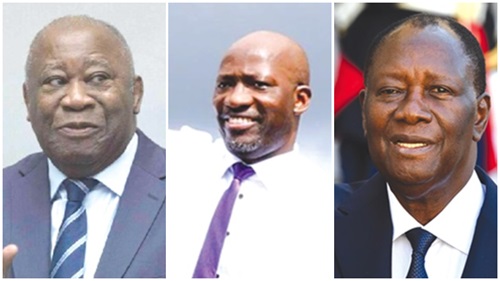Ghana’s neighbour, Cote D’Ivoire, is scheduled to have elections in October.
The upcoming election, however, is not without its controversy.
Last week, it was reported that the Independent Electoral Commission had banned four candidates - Tidjane Thiam, Laurent Gbagbo, Charles Blé Goudé and Guillaume Soro from the electoral list. Essentially, these candidates are not allowed to contest in the upcoming election.
The speculation is that they pose a threat to current President Alassane Ouattara’s potential candidacy for another term in office.
Constitutional change
When he was first elected, a presidential term was five years with no term limits. In 2016, the Constitution introduced a two-term limit for Presidents.
Although the current President had been re-elected to serve another five-year term in office, he argued the constitutional change “restarted” the term limits clock.
It was on this basis that he contested the 2020 election to serve another five-year term in office.
The argument was upheld by the country’s Constitutional Council.
If indeed the 2016 Constitution “restarted” the term limits clock for President Ouattara, as he and his supporters argue, then it is likely to see him as a candidate in the upcoming election.
At a time of growing concerns about democracy in the West-African subregion, our Ivorian neighbours head into an election facing a two-dimensional “democracy dilemma.”
Dissatisfied, but committed
The most recent Afrobarometer survey (Round 10, 2024), and how Ivorians responded to certain questions illustrate this “democracy dilemma.”
First, only four out of 10 (40 per cent) Ivorians say they are “fairly satisfied/very satisfied” with the way democracy works in the country.
In addition, only 21 per cent believe the country is a “full democracy.”
Second, there are other dimensions of the country’s democracy practices that are becoming pinch points for citizens.
Here are the percentages of those who believe they are “completely free” to do the following – a) freedom to say what you think (21 per cent); b) freedom to join any political organisation (36 per cent); and c) news media can report and comment on the news without censorship or interference by the government (16 per cent).
Third, here are two additional observations – a) 54 per cent believe the President “often/always” ignores the laws and b) 49 per cent believe the President “often/always” ignores parliament.
This is concerning because it paints a picture of a democracy where the executive’s actions potentially undermine the separation of powers and respect for the independence of two co-equal branches of government.
Preference
Reflect for a moment on these other sentiments expressed by Ivorians. As many as seven out of 10 (70%) say, “democracy is preferable to any other form of government.”
To further demonstrate their preference for democracy, Ivorians reject non-democratic alternatives by saying they “disapprove/strongly disapprove” of the following forms of government – a) one-party rule (84 per cent); b) one-man rule (84 per cent); and military rule (63 per cent).
In short, even against the backdrop of dissatisfaction with democratic practices, Ivorians remain committed in their support for democracy.
Distrustful, but supportive
Ivorian have concerns about an important aspect of electoral integrity – the role of the election management body.
Only 23 per cent express “a lot” of trust in the country’s election management body.
Under such a cloud of low trust, citizens may find it difficult to accept the fairness and impartiality of institutional decisions.
To further complicate the trust challenge are two related issues.
First, only four out of 10 (42 per cent) rated the last election as “completely free and fair.”
The sanctity of the ballot shows signs of concern because just 49 per cent say they are “completely free” to choose who to vote for.
Nonetheless, they are unequivocal in their support (81 per cent) for using elections to choose leaders.
Also, eight out of 10 (75 per cent) support a two-term limit for Presidents.
Democracy’s future
Some pro-democracy voices have expressed concerns about some of the events characterising the pre-election environment – a) the disqualification of Tidjane Thiam on citizenship grounds; b) the disqualification of additional candidates; c) the independence of the election management body; and d) implications of a possible fourth term in office for the current President should he contest and emerge the winner.
These concerns lead some to worry whether unfolding events can potentially lead to a weakening of the country’s democracy architecture.
The election is roughly four months away.
Perhaps there is still time for pro-democracy voices in the country as well as the subregion to engage in efforts to ensure an electoral outcome whose integrity will be accepted by all contesting parties.
But any such pro-democracy activities must contend with the current condition of the country’s civic space which the civil society monitoring tool “CIVICUS” classifies as obstructed.
Events over the next couple of months will determine the extent to which these concerns remain, defuse or escalate.
Hopefully, for the sake of the Ivorian commitment to democracy, only positive events will unfold.
The writer is the Project Director, Democracy Project.

